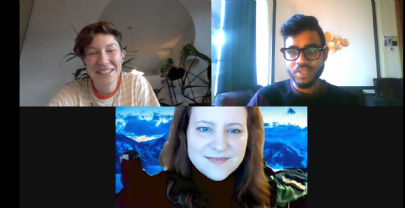How can technology and digital platforms be used to supplement mentoring? Several mentoring programmes have been working on implementing digital solutions into mentoring and one of them is Catalysts. Based in Norway, they are making great progress towards creating an inclusive society by contributing to the integration and social inclusion of youth and adults with minority and immigrant backgrounds in Norway.
We got in contact with Sarah M. Przedpelska and Rebecca Lynn Radlick who have conducted several studies into the effectiveness of Digital Mentoring Platforms and Digitally Enhanced Mentoring in the context of immigrant youth. Sarah is the programme director of Catalysts mentoring organization. Rebecca is a post-doctoral researcher at the Norwegian Research Center and project leader at the department of digital health research at the University of Oslo. Together they are working on a joint research collaboration since 2017 to focus on the evidence base of mentoring; Identify how digital tools can stimulate mentoring relationships, provide better outcomes and investigate how mentoring impacts different factors of social capital.
So what exactly do they refer to when talking about digital programmes and digitization? In the context of mentoring this can manifest in several forms; from SMS to communicate and collaborate between mentors and mentees to fully digital systems. These digital tools have been developed and implemented from a user-centric perspective but do not intend to replace people with an app. One important thing to take into consideration when adopting digital tools in mentoring is it should not replace the relationship or weaken it. From their perspective, the ideal solution would include hybrid solutions to supplement in-person meetings with digital contact and using digital tools for training mentors. “So start with a face-to-face meeting and then supplement it with digital platforms developed specifically for mentoring and with the collaboration of the youth and the adult participants as well as the programme coordinators in these programmes.”
But then with the COVID-19 lockdown, everything changed on how many mentoring programmes work. Catalysts programme had to transition to entirely digital programmes which tested the first iteration of the digital systems developed before the lockdowns. This was a major learning moment to further develop digital tools for mentoring programmes from the findings, lessons, and challenges which came with it.
So what did they learn from this experience during the lockdowns? Firstly, no one is looking for social media platforms for purpose of mentoring. Secondly, people see the value of different digital tools for their needs with regards to the mentoring programme. These needs are related to secure communication, training of the mentors, and platforms to connect and tap into other people. Originally, the programmes were facilitated by the programme managers on an analog basis; using SMS and WhatsApp. However, the best results in implementing digital tools and systems can be observed when utilizing them to replace some of this work done by programme managers. Things such as binders, phone calls, and other ad-hoc methods can be effectively be replaced by these digital tools and streamline their work. One positive outcome of the COVID-19 was a greater willingness to participate in digital events and utilizing digital tools. Mentors are now curious about using digital platforms and want to learn more on how to adopt them into their mentoring activities. For the youth mentees, these systems help them stay in touch with their mentors through dedicated digital channels and reminders to keep track of their busy lives.
How can these digital systems influence the mentoring relationships? The COVID-19 lockdowns have increased the need for mentor-mentee relationships to provide support in these trying times. Catalysts had tested different ways of testing out how the digital systems can be used to initiate and develop mentor-mentee relationships. They have tried relationships that were started and kept completely digital, there were hybrids systems where the relationships were started in person and then moved to digital platforms, and then some relationships were kept entirely face-to-face (along with proper precautions for COVID). Comparing these different initiatives presented interesting outcomes; completely digital and completely face-to-face relationships were more successful than hybrid relationships. So proper management of expectations is key for maintaining successful mentoring relationships and people can maintain certain types of communication, whether it is entirely digital or entirely in-person. “But the hybrid of not knowing what it will be this time has created a lot of insecurity and we do not have large enough numbers to say that is definitely the trend.”
One of the studies conducted by Rebecca and Sarah was “Experiences and Needs of Multicultural Youth and Their Mentors, and Implications for Digital Mentoring Platforms: Qualitative Exploratory Study”. This study investigated how digital support could meet these needs and how such digital systems can be designed and implemented. Three main themes were identified; the need for connection, help in achieving goals, and need for security and control. The study findings offered suggestions for designing digital solutions to supplement in-person mentoring of multicultural youth. Some of these suggestions were digital support for managing the mentoring relationships, fostering social capital and systems to ensure security and control. You can read this research article and find out more about digital systems here.
Another research they have worked on is “Digitally Enhanced Mentoring for Immigrant Youth Social Capital: Protocol for a Mixed-Methods Pilot Study and a Randomized Controlled Trial”. This study aims to assess the implementation and effectiveness of digitally augmented mentoring programs for immigrant youth as an intervention to promote social capital. This pilot study will be used to make potential adjustments to the interventions to prepare for a full-scale study in the future. You can read this research article here.
